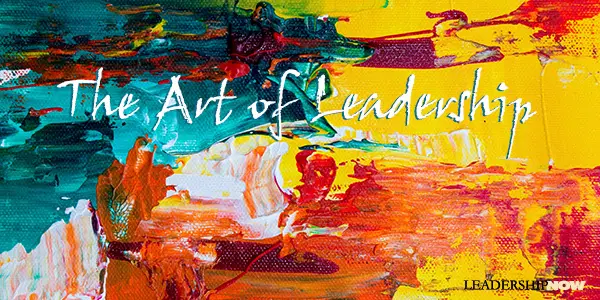 |
 |
09.23.11

The Art of Leadership
MAX DEPREE popularized the idea that leadership is an art. So much of what a leader does cannot be objectively measured. To reduce leadership to a set of algorithms is to remove it from its context; to ignore the complexities, the contradictions, and the possibilities. Artists must deal with uncertainty, contradictions, and diversity almost by definition. Leaders need to have this capacity. Julie Burstein has created a valuable achieve of thought about art and artistry in Spark: How Creativity Works. Her book is drawn from hundreds of hours of conversations from the radio program Studio 360. Studio 360 was created to show how creativity works by talking to some of the world’s most talented people. I hope you find these artist’s thoughts on their work inspiring to you no matter where you lead. Painter Chuck Close reminds us that leadership is about results. You will be judged on your accomplishments. So, you have to get on with it. Inspiration is for amateurs, and the rest of us just show up and get to work. But so much of it comes out of the process … if you try to preconceive everything you do and conceptualize it, you’re gonna do the same thing over and over. If, however, you just get busy and things occur to you in the process, you make the rules and therefore you can break them. Sound designer Ben Burtt talks about the importance of being what Saul Bellow once called a “first class noticer.” We need to observe more, to listen closer, and be open to surprises. Many of the most useful sounds I’ve used were discoveries made by accident. I would be going about some other business but then hear something interesting. I learned to keep my recorder nearby. I’d grab a sound that caught my attention. Even if you don’t know what it’s going to be. If something interests me, if something is provocative in some way, if it has a sense of suspense to it, or power, or humor, then it’s worth gathering and stockpiling until I find a place in a movie to use it. I have a big collection and it’s always growing. I’m probably always listening to what goes on around me, whether I want to or not. Being a leader means stretching yourself and your team; getting out of your comfort zone; becoming more than is expected. Choreographer Elizabeth Streb knows the importance of taking a risk. “What the audience sees is somebody taking their physical entity and just stretching it beyond their comfort.” It’s not that the dancers want to put themselves in harm’s way, she explained. “It’s the other way around. To effect certain actions onstsage, it’s necessary to put yourself in harm’s way. I think it’s a means to an end. If you don’t allow yourself to get out of your comfort zone, then you can’t discover new physical territory. And it comes with that territory that here’s going to be certain things that scare you. You’re going to try to locate them, and unravel them, and go further and further and further toward something that you couldn’t imagine doing physically prior to that initial investigation. Getting out and discovering new territory is how leaders define choices. And some days it’s easier than others says Streb. We are all normal people and we’re scared of similar things that other people are scared of. We just have an appetite to dig into them and conquer them on some level. And then the fear switches…. All of a sudden, on a Wednesday, you’re just terrified, you can’t do it. There’s no accounting for those shifts in fear. The late poet Stanley Kunitz reminds us that like most things in life, leadership requires pruning; eliminating those things that distract and detract. Creative destruction. It’s an art. As with the making of a poem, so much of the effort is to get rid of all the excess, and at the same time be certain you are not ridding the poem of its essence. While it’s in a leader’s DNA to shake-up the status quo, it has to be done with the past in mind. The past is not all bad, and the future is not all better. The past can serve as an anchor, but it can also provide depth to the future. Director Alexander Payne points to the importance of our past. We forget our past do quickly, but we need it for a sense of identity. For some idea of who we are. Photographer David Plowden would agree. I fear that we are eradicating the evidence of our past accomplishments so quickly that in time we may well lose the sense of who we are. Of course, leaders can’t do it alone. We are made better by the teams we build and the people we associate with. It’s how we learn and grow. Robert Plant speaks of his collaboration with Alison Krauss on the album Raising Sand: Something had to happen for me where I was going to learn something. I wanted to work with people who were going to push me, and not threaten me but challenge my whole capacity to be a really proper singer. Not just a one-trick pony, but somebody who could actually modify and adapt and get into some kind of dreamscape. As it happens, this is the combination that transpired, and it couldn’t be better, really. If our insecurities get in our way and we exclude those with differing opinions or those who might be critical of what we are doing, we attenuate our leadership potential. We narrow our perspective. Architect’s Denise Scott Brown and Robert Venturi are a married couple and partners in work. They value each other’s criticism in the creative process. Denise explains: We jump-start the design process by batting ideas around between us. Our ideas bounce back and forth….This questioning intensifies the process and speeds it up. Self-criticism might eventually have led him to the same position, but my questions and suggestions push him and he gets there faster. Of course, he does the same for me. “Intensifies the process and speeds it up.” That’s a good way to think about it. As in any creative endeavor—and each of us is a creative endeavor—we need to be who we really are and not a reflection of someone we admire. Robert Venturi’s respect for the past doesn’t mean recreating it. Our heroes should serve as a reference point, but not a straightjacket. Reference to the historical past can enrich architecture; copying stultifies it. When it isn’t working you have to have the courage to rework it or even start over if necessary. Novelist John Irving once took an 800-page book back from the publisher because it wasn’t right. It was such an enormous undertaking to rewrite this book from the first person to a third-person novel. Took me nine months, all by hand. I hope I come to that conclusion sooner if it happens again. But when it is working, Chuck Close says you should celebrate! Every time I finish a painting, I play Aretha Franklin full blast, from start to finish, and I usually sing along with her as my celebratory end to each painting. Author and producer Julie Burstein says that we should “never miss this essential step of celebrating the accomplishment.” The work now, she concludes, is for each of us to create our own stories. 
Posted by Michael McKinney at 03:03 PM
|
BUILD YOUR KNOWLEDGE


How to Do Your Start-Up Right STRAIGHT TALK FOR START-UPS 
Grow Your Leadership Skills NEW AND UPCOMING LEADERSHIP BOOKS 
Leadership Minute BITE-SIZE CONCEPTS YOU CAN CHEW ON 
Classic Leadership Books BOOKS TO READ BEFORE YOU LEAD |